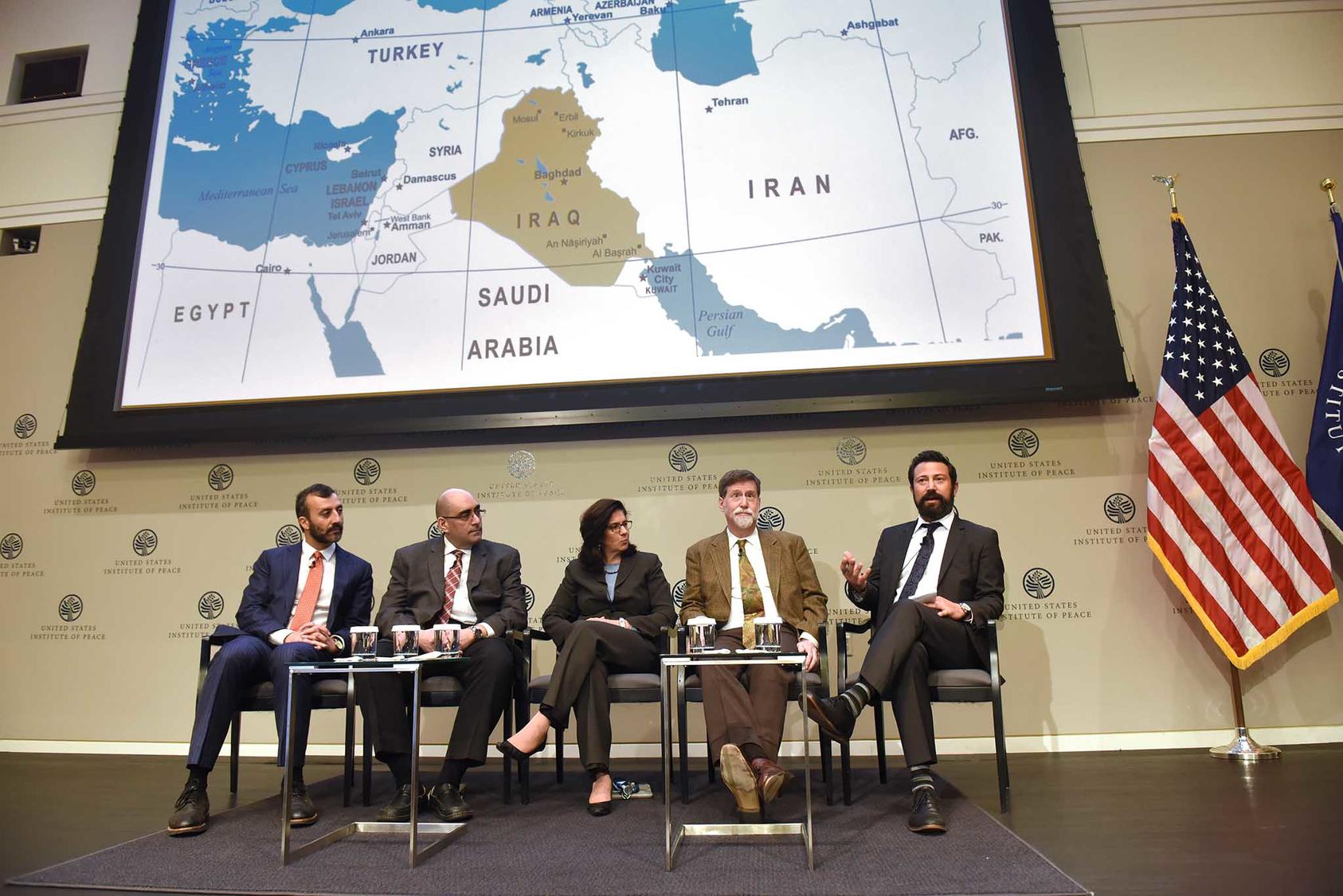Iraq and Syria: Views from the U.S. Administration, Military Leaders and the Region
Read the event coverageWith ISIS driven from its urban strongholds in Iraq and Syria, the urgent task of stabilizing the region – and preventing the return of terrorists – is underway. While Iraq and Syria face many internal challenges and tensions, Iran, Turkey, Arab Gulf State, the United States and Russia are advancing competing agendas. What are the stakes for Iraq, Syria, the region and the world as the struggle for leverage, stability, and reconciliation continues after ISIS? What is the U.S. role?
U.S. Administration and military leaders, senior Iraqi representatives and regional experts explored one of the most complex and consequential conflicts of our time. USIP and guest experts helped navigate the key themes and provide insight on the terrain ahead in Iraq and Syria.

Panel 1, 10:00am - 11:00am
A PIVOTAL MOMENT FOR IRAQ
Following Iraq’s defeat of ISIS, the country must manage a web of internal challenges and conflicts, many deepened by the war. As the country prepares for a critical national election, its social fabric is torn by sectarian tensions, the ongoing displacement of over 2 million citizens, and the Kurdistan region’s 2017 independence referendum. The economy is stagnant; corruption is pervasive. Yet Iraqi pride in the military victory against the ISIS extremists has increased nationalist sentiments in many communities. Many hope the victory and the country’s energy shifting into politics would enable positive change. So what is the path ahead? Experts discussed Iraq’s recovery from ISIS and the country’s future.
Panelists
- Ambassador Alberto Fernandez, Moderator
President, Middle East Broadcasting Networks - Ambassador Fareed Yasseen
Ambassador to the United States, Republic of Iraq - Bayan Sami Abdul Rahman
Kurdistan Regional Government Representative to the United States - Sarhang Hamasaeed
Director, Middle East Programs, U.S. Institute of Peace
Panel 2, 11:20am - 12:30pm
ENTERING THE POST-ISIS ERA: IRAQ AND ITS NEIGHBORS
Beyond Iraq’s domestic post-ISIS challenges, the region is faced with continued conflict and instability, particularly in Syria. This panel will explore developments among Iraq’s neighbors amid continuing tensions in the region. Regional experts discussed developments in Syria, Turkey, the Arab Gulf states, Iran and Russia and their impact on the region’s post-ISIS landscape.
Beyond Iraq’s domestic post-ISIS challenges, the region is faced with continued conflict and instability, particularly in Syria. This panel will explore developments among Iraq’s neighbors amid continuing tensions in the region. Regional experts will discuss developments in Syria, Turkey, the Arab Gulf states, Iran and Russia and their impact on the region’s post-ISIS landscape. Panelists: Kevin Baron, Moderator Founding Executive Editor, Defense One Dr. Elie Abouaoun Director, Middle East and North Africa Programs, U.S. Institute of Peace Dr. Mark N. Katz Professor of Government and Politics, George Mason University Alireza Nader Senior International/Defense Researcher, RAND Mona Yacoubian Senior Advisor for Syria, U.S. Institute of Peace
Panelists
- Kevin Baron, Moderator
Founding Executive Editor, Defense One - Dr. Elie Abouaoun
Director, Middle East and North Africa Programs, U.S. Institute of Peace - Dr. Mark N. Katz
Professor of Government and Politics, George Mason University - Alireza Nader
Senior International/Defense Researcher, RAND - Mona Yacoubian
Senior Advisor for Syria, U.S. Institute of Peace
Keynote Panel, 1:30pm - 2:30pm
FRAUGHT TERRAIN: STABILIZING IRAQ AND SYRIA AFTER ISIS
The role of the United States is seen as indispensable throughout the Middle East, and many are looking to understand new directions in U.S. policy in the region in the wake of the counter-ISIS military campaign. U.S. administration and military leaders discussed the stakes, challenges and requirements of bringing stability to a region in which violence persists and gains against terrorists hang by a thread.
The role of the United States is seen as indispensable throughout the Middle East, and many are looking to understand new directions in U.S. policy in the region in the wake of the counter-ISIS military campaign. U.S. administration and military leaders will discuss the stakes, challenges and requirements of bringing stability to a region in which violence persists and gains against terrorists hang by a thread. Panelists: Stephen J. Hadley, Moderator Chair, Board of Directors, U.S. Institute of Peace General Joseph L. Votel CENTCOM Commander Ambassador Mark Green Administrator, U.S. Agency for International Development Brett McGurk Special Presidential Envoy for the Global Coalition to Defeat ISIS, U.S. Department of State
Panelists
- Stephen J. Hadley, Moderator
Chair, Board of Directors, U.S. Institute of Peace - General Joseph L. Votel
CENTCOM Commander - Ambassador Mark Green
Administrator, U.S. Agency for International Development - Brett McGurk
Special Presidential Envoy for the Global Coalition to Defeat ISIS, U.S. Department of State



